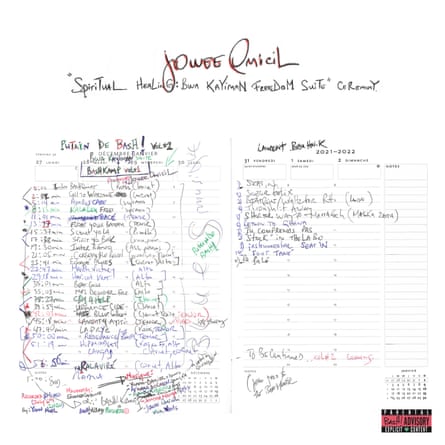I
In August 1791, a group of enslaved Haitians gathered in the forest of Bois Caïman, located on Haiti’s northern coast, and performed a clandestine Vodou ritual that sparked the Haitian Revolution. This collective ceremony, which became a catalyst for a widespread rebellion, serves as the creative inspiration for Haitian saxophonist Jowee Omicil’s newest album, Spiritual Healing: Bwa Kayiman Freedom Suite. Through an hour-long performance, Omicil translates the spiritual energy of the ceremony into a free jazz arrangement, utilizing various woodwind and brass instruments alongside percussion, keys, and bass.
The album begins with a simple approach, as Omicil sings while the saxophone plays a melancholic melody, accompanied by the deep sounds of the bass clarinet and Yoann Danier’s ka drum. Danier’s hand moves across the drum like rustling leaves, transporting the listener to the imagined setting of Bois Caïman. However, Omicil breaks the calm with a strong call on the cornet. This sets the tone for the rest of the album, with compositions that initially establish a sense of comfort before unexpectedly changing course and defying expectations.

For example, on songs like “Spirit Yo Bak,” a fast and complex drum and ka rhythm is played with passion, followed by pianist Randy Kerber’s quieting of the percussion for a slow and thoughtful solo. In contrast, “Blue Cotton” begins gently with Omicil’s airy flute setting a steady tune and then transitions into a chaotic mix of saxophone melodies over Arnaud Dolmen’s crashing cymbals.
It all works to jolt listeners to attention, keeping us poised for this sense of change and tension – the risk of uprising. His band never fully explode into the spiritually cleansing, life-reimagining free jazz of genre pioneers such as Albert Ayler; Omicil instead invites us to enter a fidgety space of possibility. It’s not always easy to listen to, but it is exciting, its sudden ructions suggesting that revolution is always an option, and closer than we might think.
is
Also released this month is
Aron Ottignon, a producer from New Zealand, and the Senegalese group, Jeri Jeri Band, collaborate on their debut album Dama Bëgga Ñibi (Urban Trout Records). This album features catchy electronic melodies and lively rhythms, with powerful vocals from a variety of artists. French-Beninoise singer Mina Agossi combines jazz improvisation with electronic elements on her latest album Lonely Whales (Alchimie Records). While the subtle synth pads and sound design may go unnoticed at times, they provide a perfect foundation for Agossi’s agile vocals on the title track. El Terreno (Music for Dreams) by flamenco guitarist Jacob Gurevitsch is a simple yet moving collection of finger-picked melodies. The standout track “For Your Love” features the expressive trumpet playing of Cuban jazz musician Arturo Sandoval.
Source: theguardian.com















